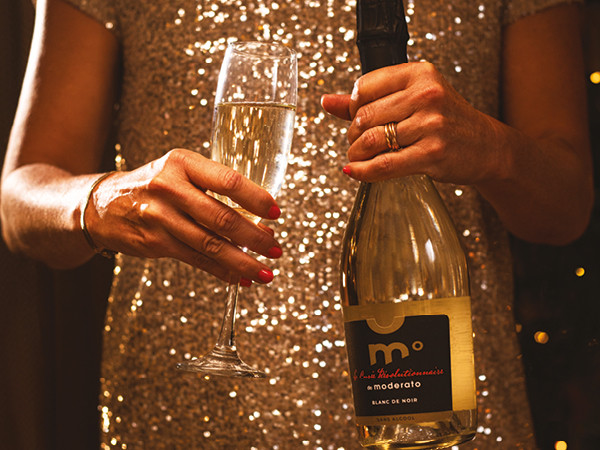
Guy Woodward: Why all producers should consider 0% abv wines
It has, I admit, taken me rather a long time to take 0% alcohol wines seriously. I’ve long been sceptical about their quality. But I’ve finally got my head around their importance. Why? Because I’ve managed to navigate that key stumbling block that trips up many a middle-aged man – the fact that I am not the target market.
My Damascene moment came at a launch at which I was the oldest attendee by around two decades. As I gave my feedback on Moderato’s 0% wines to Laura Willoughby, founder of mindful drinking community Club Soda and the country’s leading authority on low & no, she stopped me. “The mistake you’re making is comparing the taste to wine. Gen Z aren’t looking for a wine substitute – they’ve never drunk wine in the first place.”
To be fair, this should have been obvious – any brand that misspells Blanc de Noirs on its label probably isn’t going after a wine audience. On the flipside, I thought Moderato was pretty decent for £15. And the brand is on a roll, making 200,000 bottles a year via grapes grown in its Gascony vineyards and vinified at its own de-alcoholisation facility. The Colombard harnessed for the white wine boasts sufficient acidity to withstand the process and the final product does at least have a vinous quality to it.
Which is more than can be said for Wild Idol, a concoction made by simply chilling unfermented grape juice, carbonising it and then charging £25 for what is essentially a pimped-up Shloer. Then again, what do I know? Under CEO Paul Beavis (formerly MD of Champagne Lanson), the vegan, halal-certified, gluten-free brand has secured listings at Harrods, Selfridges and Daylesford, as well as on-trade accounts at Mandarin Oriental, The Dorchester, The Connaught and Gleneagles.
And here we’re into another market of which I’m not a part – the wealthy, health-conscious ‘flexitarians’ or abstainers on cultural, social or religious grounds who are the target clientele of the much-hyped, £109 French Bloom.
Maggie Frerejean-Taittinger, one half of the couple behind the brand, is aiming at “the CFO or CEO who is waking up at 5am, meditating, exercising, having a breakfast meeting and then going straight through till midnight… and who needs a status symbol at a client dinner, but doesn’t want to drink alcohol”.
↓
No-alcohol cheers
It’s easy to be seduced by such a gilded lifestyle (Frerejean-Taittinger says she struggled to find a decent non-alcoholic drink at the myriad “high-end restaurants, launches and gallery openings” she attended while pregnant). And I can’t help feeling that’s what led to some of my colleagues’ rather gushing reviews (wine writers love to enthuse about products they would never dream of spending their own money on). What is unequivocal, though, is that there is a bona fide audience that wants to be part of that scene without drinking alcohol. “Previously, I felt a bit excluded,” added Frerejean-Taittinger. “Like I wasn’t part of the ‘cheers’ moment.”
To me, French Bloom tasted vaguely like an oxidised Champagne, with a weird, overly manipulated nose (although, unlike most 0% fizz, it did at least hold its bubbles). I gave it to my teetotal brother-in-law, who thought it was “OK” until I told him the price, at which point he literally spat it out. Though as he observed, “I wouldn’t pay over £100 for a normal bottle of wine either, so what’s the difference?”
It’s a fair question – and many people don’t see one. The Sloane hotel plans to list French Bloom at around £25 a glass, £2 less than Billecart-Salmon. As Willoughby says: “The quality of the experience – recreating that wine moment – is key, and we have more and more customers asking where the grapes are from and how it’s made.”
Which is why French Bloom making a vintage wine and Moderato putting its wines under cork – however ridiculous that seems – makes sense (though there needs to be more scrutiny of the energy-sapping de-alcoholisation of such wines, an extra step of the process with an undeniable environmental impact).
How long, then, until the genre is taken seriously by the traditional wine sector? Its future, says Willoughby, is about “identity and authenticity”. At Vinexpo Paris, Moderato, which trumpets its “terroir approach”, says it was inundated with enquiries from winemakers about its facility. It’s clear that 0% wines will continue to grow market share – and it’s equally clear that whichever wine brand cracks it, and can bring that authenticity, heritage and provenance to bear, will make a killing.




